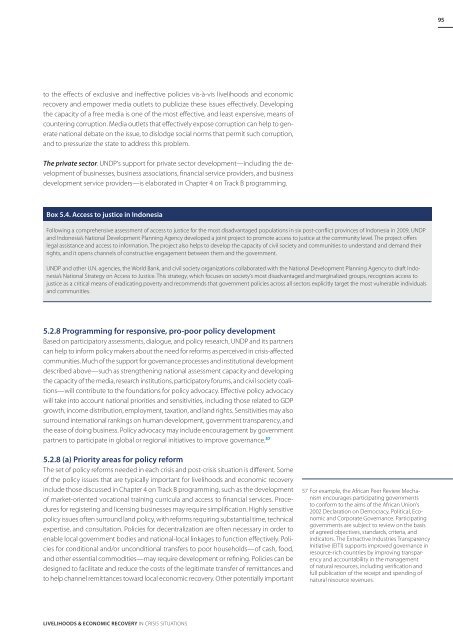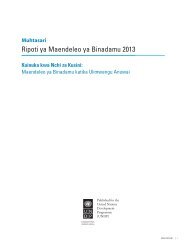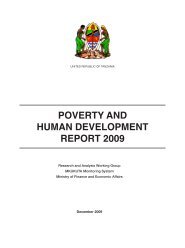Download PDF (4.08 MB) - ReliefWeb
Download PDF (4.08 MB) - ReliefWeb
Download PDF (4.08 MB) - ReliefWeb
You also want an ePaper? Increase the reach of your titles
YUMPU automatically turns print PDFs into web optimized ePapers that Google loves.
95<br />
to the effects of exclusive and ineffective policies vis-à-vis livelihoods and economic<br />
recovery and empower media outlets to publicize these issues effectively. Developing<br />
the capacity of a free media is one of the most effective, and least expensive, means of<br />
countering corruption. Media outlets that effectively expose corruption can help to generate<br />
national debate on the issue, to dislodge social norms that permit such corruption,<br />
and to pressurize the state to address this problem.<br />
The private sector. UNDP’s support for private sector development—including the development<br />
of businesses, business associations, financial service providers, and business<br />
development service providers—is elaborated in Chapter 4 on Track B programming.<br />
Box 5.4. Access to justice in Indonesia<br />
Following a comprehensive assessment of access to justice for the most disadvantaged populations in six post-conflict provinces of Indonesia in 2009, UNDP<br />
and Indonesia’s National Development Planning Agency developed a joint project to promote access to justice at the community level. The project offers<br />
legal assistance and access to information. The project also helps to develop the capacity of civil society and communities to understand and demand their<br />
rights, and it opens channels of constructive engagement between them and the government.<br />
UNDP and other U.N. agencies, the World Bank, and civil society organizations collaborated with the National Development Planning Agency to draft Indonesia’s<br />
National Strategy on Access to Justice. This strategy, which focuses on society’s most disadvantaged and marginalized groups, recognizes access to<br />
justice as a critical means of eradicating poverty and recommends that government policies across all sectors explicitly target the most vulnerable individuals<br />
and communities.<br />
5.2.8 Programming for responsive, pro-poor policy development<br />
Based on participatory assessments, dialogue, and policy research, UNDP and its partners<br />
can help to inform policy makers about the need for reforms as perceived in crisis-affected<br />
communities. Much of the support for governance processes and institutional development<br />
described above—such as strengthening national assessment capacity and developing<br />
the capacity of the media, research institutions, participatory forums, and civil society coalitions—will<br />
contribute to the foundations for policy advocacy. Effective policy advocacy<br />
will take into account national priorities and sensitivities, including those related to GDP<br />
growth, income distribution, employment, taxation, and land rights. Sensitivities may also<br />
surround international rankings on human development, government transparency, and<br />
the ease of doing business. Policy advocacy may include encouragement by government<br />
partners to participate in global or regional initiatives to improve governance. 57<br />
5.2.8 (a) Priority areas for policy reform<br />
The set of policy reforms needed in each crisis and post-crisis situation is different. Some<br />
of the policy issues that are typically important for livelihoods and economic recovery<br />
include those discussed in Chapter 4 on Track B programming, such as the development<br />
of market-oriented vocational training curricula and access to financial services. Procedures<br />
for registering and licensing businesses may require simplification. Highly sensitive<br />
policy issues often surround land policy, with reforms requiring substantial time, technical<br />
expertise, and consultation. Policies for decentralization are often necessary in order to<br />
enable local government bodies and national-local linkages to function effectively. Policies<br />
for conditional and/or unconditional transfers to poor households—of cash, food,<br />
and other essential commodities—may require development or refining. Policies can be<br />
designed to facilitate and reduce the costs of the legitimate transfer of remittances and<br />
to help channel remittances toward local economic recovery. Other potentially important<br />
57 For example, the African Peer Review Mechanism<br />
encourages participating governments<br />
to conform to the aims of the African Union’s<br />
2002 Declaration on Democracy, Political, Economic<br />
and Corporate Governance. Participating<br />
governments are subject to review on the basis<br />
of agreed objectives, standards, criteria, and<br />
indicators. The Extractive Industries Transparency<br />
Initiative (EITI) supports improved governance in<br />
resource-rich countries by improving transparency<br />
and accountability in the management<br />
of natural resources, including verification and<br />
full publication of the receipt and spending of<br />
natural resource revenues.<br />
Livelihoods & Economic Recovery in Crisis Situations





